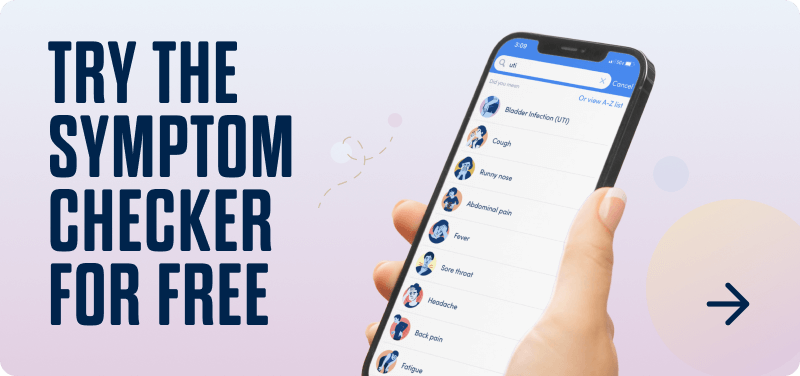Are you experiencing a loss of appetite? Are you struggling to eat meals regularly? Or maybe you’re suddenly feeling unmotivated to prepare and eat food on a daily basis?
These could all be signs of an underlying medical condition.
While some of the conditions could be minor and can be remedied with simple lifestyle changes, others may be serious and require medical treatment.
In this article, we’ll explore some of the main causes of appetite loss and also explore treatment options and prevention methods that you could consider.
We’ll also look at scenarios where you’d need to seek medical help for loss of appetite.
What is Loss of Appetite?
A healthy appetite tells your body when it is time to eat.
Loss of appetite or a decreased appetite is when your desire to eat is significantly decreased.
In most cases, a loss of appetite is temporary due to things like stress, injury, illness, or other factors that can impact a person’s ability and desire to eat.
If you are suffering a loss of appetite for more than a few days, then make an appointment with a healthcare professional for a thorough evaluation.
See a doctor online.
Start my visitCauses
Several different reasons could cause your appetite to decrease or disappear altogether.
You may have noticed that while you are sick with the flu or a cold, you might experience a loss of taste and smell, making it difficult to have an appetite or enjoy food.
It is also common to lose track of time and not have the energy to eat while you are overworked, stressed and busy with other things.
Below we’ll look at common causes of appetite loss in some more detail.
Bacteria and viruses
Ailments caused by viruses, bacteria, fungi, or other types of infections can hinder your normal appetite levels.
Some of these ailments include:
- Stomach viruses and bacterial infections
- Influenza, the common cold, and other upper respiratory infections
- COVID-19 and other viral infections
- Urinary tract infections, including kidney infections
- Chest infections, like pneumonia
- HIV, tuberculosis (TB), cancers, and other autoimmune compromising long term illnesses
Psychological causes
The state of your mental health can have a significant impact on your appetite.
Some of these can be temporary, such as a stress reaction, but others can be long-term and can affect a person’s feeding habit.
Those living with depression, anxiety, grief, and stress may experience a loss of appetite as they process their feelings and lose interest in eating.
It helps to consume a nutritious diet and stay well hydrated while dealing with depression and other mental ailments.
Psychological eating disorders such as anorexia nervosa and bulimia are serious mental illnesses that cause people to view food in an unhealthy manner.
Those suffering from anorexia will restrict themselves from consuming enough food and calories to keep their weight as low as possible.
People with bulimia consume large amounts of food too quickly and then use harmful methods to purge this food out of their bodies almost immediately.
If you think that you or a loved one is suffering from psychological causes of appetite loss, seek professional medical help immediately.
If you notice that you or someone you know has an unhealthy or obsessive relationship with food, it is advisable to book a consultation with a healthcare expert before the condition worsens.
Medication side effects
Certain drugs and medications can reduce your appetite or desire to eat.
The side effects of some medications, such as antibiotics and antidepressants, may cause nausea, diarrhea, and drowsiness, making you feel tired and lose your appetite.
Some medications that may cause a loss of appetite include:
- Sleeping pills
- Morphine
- Certain blood pressure and diabetes medicines
- Chemotherapy, immunotherapy, and other cancer treatments or radiation therapy
- Cocaine, opioids, methamphetamine, and some other drugs
Medical conditions
Certain long-term medical conditions can affect our appetite and cause us to eat less or not desire food at certain points.
If you suffer from long-term and chronic pain in parts of your body due to conditions like migraines, arthritis, fibromyalgia, orchialgia, or nociceptive pains, eating can become difficult and uninteresting.
Those living with medical conditions such as asthma, HIV and AIDS, cancer, IBS, and alcoholism may experience a loss of appetite.
Treatment
A healthcare professional should evaluate each cause of appetite loss lasting more than a day or two.
Treatment will depend on the cause and may include lifestyle changes, medication, and therapy.
Home care
Certain basic lifestyle changes can help you increase your appetite and stimulate your desire for food.
Sticking to a daily routine allows your body to recognize when it is time to eat and when it is time to rest.
Keep your eating area separate from your bedroom and away from recreational distractions. Include balanced, high-fiber, and nutritious foods into your diet.
Liquid and semi-solid foods are a great way to build an appetite.
Blend foods into a soup or smoothie to make consumption quick and easy, and try to eat small meals throughout the day instead of large meals that may leave you feeling uncomfortably full.
Take part in plenty of physical activities to build an appetite, do breathing exercises to relax your body and mind, and get an adequate amount of rest and sleep to reduce stress on your body.
Drinking lots of water and other healthy liquids throughout the day will keep our body hydrated, which helps you feel better.
Medical care
If your loss of appetite is severe due to a psychological or medical condition, then a healthcare professional may prescribe medication, therapy, or lifestyle changes to help.
Medications that can lead to a loss of appetite as a side effect can be changed, or your dosage may need to be adjusted.
Counseling and therapy can also be used to treat eating disorders.
Prevention
Each person has their own needs and wants when it comes to consuming food and dealing with their appetite.
Some people prefer two to three large meals a day, whereas others eat smaller snacks more often throughout the day.
Learning how to cook and prepare your meals to best suit your taste is a great way to prevent a loss of appetite or disinterest in food.
If you feel hungry, try to avoid staying too long before eating something.
You will most likely eat something unhealthy out of desperation and ruin your appetite later.
Look at lifestyle areas that could be improved if you think they are having an adverse effect on your appetite.
This starts by drinking enough water throughout the day, getting plenty of sleep, eliminating stressful factors in your life, and taking part in sufficient physical exercise for your body.
Diagnosis
A medical expert can diagnose the cause of your loss of appetite by examining you and asking you a few questions about your lifestyle and family health history.
Be open and honest so that a diagnosis can be reached effectively and quickly.
See a doctor online.
Start my visitWhen to See a Medical Provider
A loss in appetite can be due to many causes like those listed above.
Only a healthcare professional can diagnose you accurately after an examination.
If you notice prolonged periods of appetite loss or a sudden change in weight and energy levels, seek medical help immediately.
Speak to a healthcare provider if you notice any additional symptoms alongside appetite loss, including:
- Difficulty swallowing
- Severe or persistent abdominal pain
- Persistent changes in bowel movements
- Dehydration
- Severe headaches
- Fever
- Loss of taste and smell
- Nausea and diarrhea
How K Health Can Help
Did you know you can get affordable primary care with the K Health app? If you have any more questions about appetite loss and difficulty with eating, then reach out to our team of experts at any time.
Frequently Asked Questions
K Health has strict sourcing guidelines and relies on peer-reviewed studies, academic research institutions, and medical associations. We avoid using tertiary references.
-
What Are the Real Facts about Bulimia? (2022).
https://americanaddictioncenters.org/bulimia-treatment/facts-and-statistics -
Appetite - decreased. (2022).
https://medlineplus.gov/ency/article/003121.htm -
Loss of appetite: managing unwanted weight loss in the older patient. (1994).
https://pubmed.ncbi.nlm.nih.gov/8125353/ -
Appetite Loss and Cancer Treatment. (2018).
https://www.cancer.gov/about-cancer/treatment/side-effects/appetite-loss

 Medically reviewed
Medically reviewed
